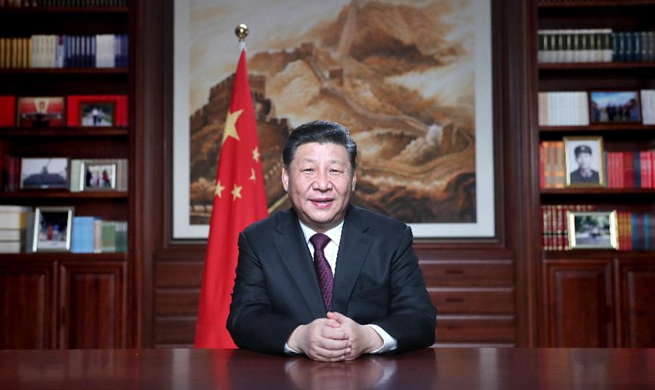LONDON, Dec. 31 (Xinhua) -- British Prime Minister Theresa May has been in contact with European Union (EU) leaders over Christmas holidays in her painstaking efforts to seek the reassurances she hopes will help her Brexit deal pass parliament in mid-January, Downing Street said on Monday.
"She has been in contact with European counterparts over the break, and you can expect more of that to continue over the week," said the prime minister's spokeswoman.
"I haven't got a list for you, but she has been in touch with European leaders, and that will continue in the lead-up to the vote," the spokeswoman added.
The prime minister is currently battling to convince British lawmakers to accept the withdrawal agreement she negotiated with the EU, which is opposed by politicians across the political spectrum, including many within her own Conservative Party.
The parliamentary vote is scheduled for the week of Jan. 14, with many members of parliament still fiercely opposing the so-called backstop arrangement aimed at preventing a post-Brexit hard border on the island of Ireland.
However, with just less than 100 days to go until March 29 -- the scheduled day of the looming divorce -- no one really knows what the future holds if May can't win enough support for her plan from fellow members of parliament.
Most British members of parliament deeply distrust May's Brexit plans, Jean-Claude Juncker, the president of the European Commission, claimed in comments that are likely to take his relationship with the prime minister to new depths.
Meanwhile, Juncker also accused the British public of being "entirely unreasonable" and told the British political class to "get their act together."
He was rebuked by May earlier this month for describing her at a summit of EU leaders as "nebulous".
Juncker, the former Luxembourg prime minister, said in a recent interview with the German newspaper Welt am Sonntag: "I have the impression that the majority of British MPs deeply distrust both the EU and Mrs. May."
"It is not us who are leaving the United Kingdom -- it is the United Kingdom that is leaving the European Union," he said.
"I find it entirely unreasonable for parts of the British public to believe that it is for the EU alone to propose a solution for all future British problems," he said.
"My appeal is this: get your act together and then tell us what it is you want," he said. "Our proposed solutions have been on the table for months."













